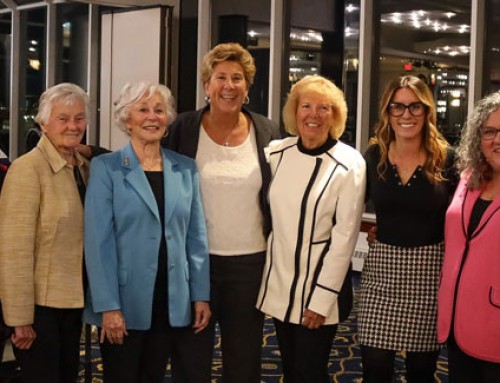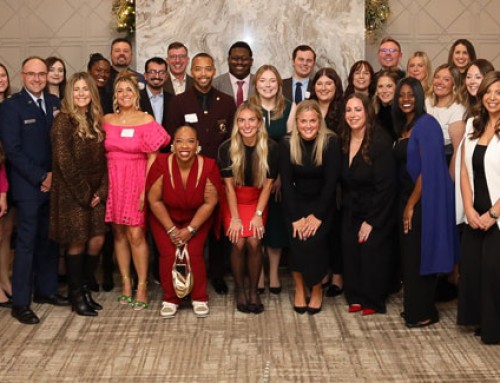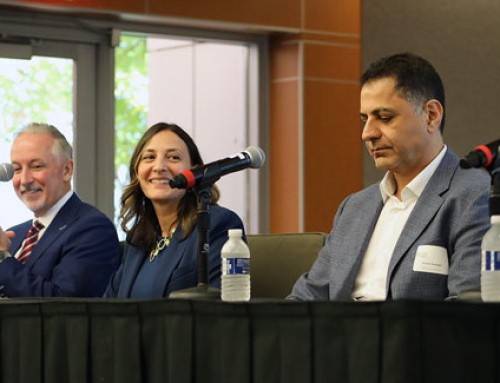Close to 100 people gathered at Andiamo’s in Warren December 1st for the Macomb Chamber’s diversity in business luncheon and learning event, co-hosted with OneMacomb. Organized by the Macomb County Chamber of Commerce, the luncheon featured a panel of Asian Pacific American Chamber Executive Director Van Nguyen, Chaldean American Chamber President Martin Manna, and Michigan Hispanic Chamber CEO Gloria Lara, who discussed a variety of issues relating to different cultures doing business in Macomb.
The panel was moderated by WXYZ Channel 7 Reporter Nima Schaffe, whose parents immigrated to the United States from Iran, and whose family is filled with entrepreneurs and includes mixed-race couples.
“It’s really very exciting what’s happening here in Macomb County,” he said starting off the discussion.
The session that followed introduced the attendees to three different, and yet similar, chambers of commerce representing various cultures and ethnicities doing business in the county.
Martin Manna of the Chaldean American chamber relayed, “We are thankful to be in Macomb County. Chaldean Chamber membership was started to combat negative stereotypes and now 40% of our membership is non-Chaldean.”
He said that immigrants form occupational patterns. For example, in the city of Detroit, 75 of 85 corner grocers are owned by Chaldeans and their numbers are large in limited service hotels as well as the cellular industry.
“We have networking events with other groups to talk about various geographic groups. There’s not a one-size fits all approach to dealing with other cultures. Our Chamber wants to be the connection – and the only way we can do that is to connect with lots of communities.”
Gloria Lara sees her role as CEO of the Michigan Hispanic Chamber as both entrepreneurial and political.
“We are small, only about 200 in number; half are Hispanic owned businesses, and most are in the automotive industry and support services.”
Lara referenced 2012 data of business owners surveyed for Michigan, and the number of firms increased (from 2007) 2.1%; however, Hispanic business-ownership increased by 84% during that time. In Macomb County those numbers showed an 9% increase with 41% increase in Hispanic-owned businesses. And while the numbers of Hispanic-owned businesses are climbing in Michigan, Hara is somewhat disappointed that this group doesn’t often reach out to the resources available to them.
“We don’t make a lot of noise and tend to stand in the background, but we are very hard workers. Michigan is a state insular to itself and it’s time we focus on making sure our voices are heard.”
How does she plan on doing that? “I like to encourage our members to find commonalities with other groups. People love to tell their (personal) stories, and that’s where relationships are formed.”
Also acknowledging the cultural occupational niches, Van Nguyen of the Asian Pacific American Chamber explained that it was mostly because ethnicities don’t want to compete with one another. “That’s why you’ll see Vietnamese in services oriented industries; Koreans as dry cleaners, Filipinos as nurses, etc.”
“We are the ‘e-Harmony’ of the automotive and IT communities,” joked Van Nguyen of her chamber. “We seek and mentor Asian business owns and their entrepreneurial dream is to do business with GM or other large companies and we have those connections.”
Nguyen sees that it’s important to be both empathetic and understanding of differing cultures in order to bring business to the Motor City. “We have to be respectful of the cultures and how they do business, but we also need to educate them how to do business here.”
“We encourage APACC members to step outside their comfort zones and get to know new people, to network with people who don’t look like them, and to talk with and learn capabilities of other and then look for collaboration opportunities rather than seeing one another as competition.”
Local leaders were lauded for their forthright approach of inclusivity and support of the varying and growing cultural diversity of Macomb County. Pam Lavers, director of OneMacomb and Deputy County Executive, was personally called upon for her straightforward relationship-building with the communities represented.
Lavers, along with Macomb Chamber CEO Grace Shore, wanted to bring an event like this diversity panel to the county after attending a similar event in Livonia.
Shore said, ”We need to celebrate our diversity, and we thought this event would be a good way to do that.”
What else can elected officials and business leaders do to support the growing diversity of business and inclusivity of community in Macomb County?
One answer seemed so unassuming it should be apparent.
Van Nguyen said, “Take a look at your most recent census data and work to understand your largest ethnic groups. Know their holidays, do some research or even use our Chamber for guidance. If you know you have a high population in certain ethnicities, translate your information and trifolds into those languages.” Being inclusive may take some time and effort, but its reward only leads to community and business growth.
Recognizing what diversity is and isn’t may be another great step in the right direction.
“Embracing cultural diversity isn’t about having a perfect balance of racial differences on your staff, it’s about bringing different ideas and approaches to your team,” said Macomb Chamber member Kim Schott of Schott Cultural Consulting, who attended the event. “Understanding different cultural perspectives of our diverse community helps us all to grow and do well in addressing their needs.”
Manna said, “Our community is doing phenomenal here,” he said, referencing Macomb as home to the largest group of Chaldeans outside of the Middle East.
“Macomb County should be a model for the nation – this county is inclusive, especially through organizations such as OneMacomb and Welcoming Michigan,” boasted Manna. “Macomb is both welcoming and supportive.”





